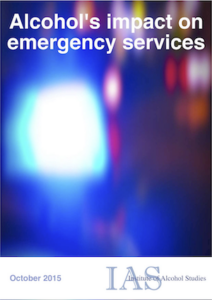View this report

Key points
- Alcohol places a significant and unnecessary strain on emergency services
- Public drunkenness makes emergency servicepeople’s lives and jobs harder
- All services want more day-to-day support in dealing with alcohol
- Frontline staff are calling for policy action to curb alcohol harm
- There are evidence-based interventions that can ease this burden
Alcohol places a significant and unnecessary strain on emergency services
A growing body of evidence is gradually revealing the extent of the burden that alcohol places upon our public services. Up to 80% of weekend arrests are alcohol-related, and just over half of violent crime is committed under the influence. In 2009/10 there were 1.4 million alcohol-related ambulance journeys, which represents 35% of the overall total. Estimates for the proportion of Emergency Department attendances attributable to alcohol vary, but figures of up to 40% have been reported, and it could be as much as 70% at peak times. Alcohol is typically found to be involved in 10-30% of all fires. Moreover, alcohol-caused fires are usually worse: 50% result in casualties, compared to 14% for other fires; and they cost five times more on average.
Our survey of front-line staff confirms the magnitude of the problem: alcohol takes up as much as half of their time. The issue is particularly acute for the police, for whom 53% of their workload, on average, is alcohol related. However, even fire and rescue teams, who reported being the least affected of the emergency services by alcohol, typically spent one in five working hours dealing with the consequences of drinking.
View this report
